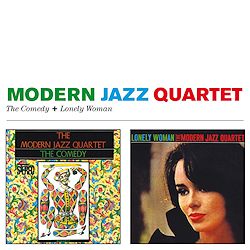1. Spanish Steps
2. Columbine
3. Pulcinella
4. Pierrot
5. La Cantatrice
6. Harlequin
7. Piazza Navona
8. Lonely Woman
9. Animal Dance
10. New York
11. Belkis
12. Why Are You So Blue?
13. Fugato
14. Lamb Leopard
15. Trieste
John Lewis (piano)
Milt Jackson (vibes)
Percy Heath (bass)
Connie Kay (drums)
Diahann Carroll (vocals on track 5 only)
1-7 originally issued as The Comedy (Atlantic SD1390)
8-15 originally issued as Lonely Woman (Atlantic SD1392)
All tracks recorded in New York, USA in January-February 1962, except track 5, October 20, 1960.
[78:42]
I well remember feeling highly sophisticated and grown up when I first discovered the MJQ way back in 1959 and I felt that even my mother would approve
because they were so obviously musical. It was true and she did but with a classical background she could hardly have thought otherwise since they
were so different to any other jazz I was listening to at the time, not there was anything wrong with that either.
The very first notes of Spanish Steps took me right back to those days as the MJQ really did have a unique sound with the strangely rarely used
vibes making such a strikingly original statement. The booklet notes explain that this is the only version of that tune that exists so it is great to have
it reissued and on that first album The Comedy there are elements of Fontessa, an extended 11 minute suite that John Lewis composed and
which appeared on the record of the same name, as did Pierrot, Columbine and Harlequin. The album title is itself an allusion to commedia dell’arte the form of theatre in which characters appeared masked and which stands for commedia dell’arte all’improvviso, or
“comedy of the very creative ability of improvisation” which perfectly chimes with the process that is the essence of jazz itself. John Lewis was the
creative driving force behind the MJQ (all but two tracks on this disc are by him) and coming from university where he studied Renaissance and Baroque
music both exerted an obvious influence when it came to his own compositions and is to be found in so many of them.
If this were the first of the group’s discs a listener heard they would be bowled over by the sheer wealth of inventiveness on display – it is so very
different to anything that had gone before and has rarely been paralleled since.
There is some brilliant playing here and the first track is no exception with every musician having a well defined role to play which they always did
impeccably. The three tracks here that originally appeared on that first commedia dell’arte inspired record Fontessa brought back fond
memories of a time when things were more relaxed and life was less complicated. In a departure from their usual format they have singer Diahann Carroll as
a guest on Cantatrice making it a real one-off. The tracks from the album Lonely Woman also contain highlights, not least Ornette
Coleman’s title track which the MJQ cover in their own special way while the originality of Coleman’s unique voice continues to shine through. Belkis is a really catchy tune with Jackson’s vibes appearing particularly singing. Gary McFarland’s Why Are You So Blue? is a
beautifully measured tune with John Lewis in an especially reflective and delicate mood matched perfectly by Jackson’s vibes, while Lamb Leopard
is wonderfully and lazily dreamy.
The MJQ made their music exciting, unique and innovative and it was a really welcome breath of fresh air when they issued their first albums in 1953. All
the tracks have the classic MJQ sound of a tightly knit group of dedicated and highly competent musicians whose goal was to take jazz to places it hadn’t
been to before. However, the problem, for me at least, is that that they stayed there and didn’t develop any further and ‘the shock of the new’ wasn’t
maintained and their music followed an almost too predictable formula. It was interesting to read from the original review of Lonely Woman by Don
DeMichael in Down Beat magazine, which despite his 4 star rating noted that “Maybe it’s a good thing that the MJQ members decided to live
separately for six months of the year. For, judging by this record, there was a tiredness creeping into the group’s playing, collectively and individually,
as if they had been through this kind of material too often before”.
There is much to admire and some truly classic tracks that helped to define jazz in the 1950s and 1960s and if a collector had no others of their records
this would be as perfect an example as they could wish to own. I don’t want to sound a note of “feinting with damn praise” because it’s only my opinion
anyway but I suspect there will not be many jazz fans that would want to own every disc the MJQ ever made while they might very well want to own every John
Coltrane or every Charlie Mingus disc since both of them, among many others, continued to push the boundaries. The MJQ made a huge contribution to the
history of jazz which cannot be denied but jazz is a living art form that must continue to evolve which was something in the end that it failed to do.
Steve Arloff
